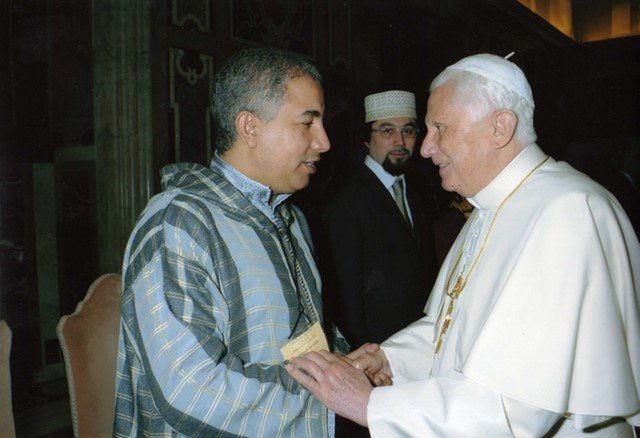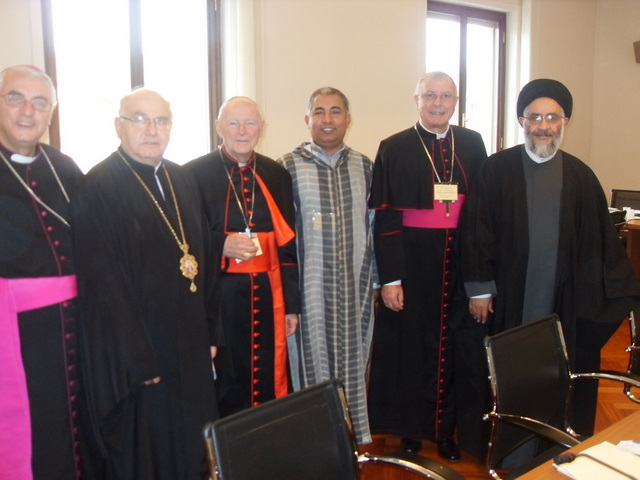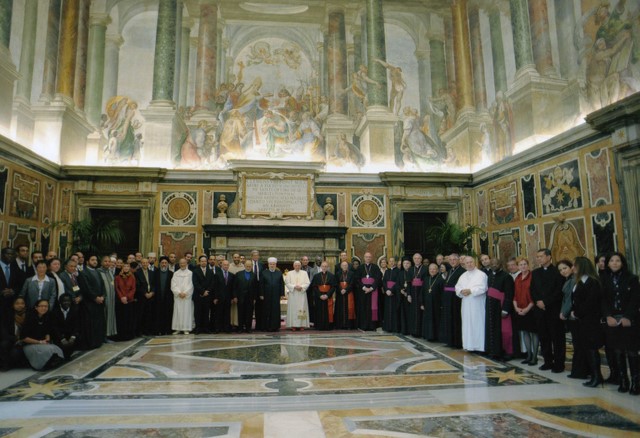Rome : First Seminar of the Catholic-Muslim Forum

First Seminar of the Catholic-Muslim Forum
Rome, 4-6 November 2008
Final Declaration
The Catholic-Muslim Forum was formed by the Pontifical Council for Interreligious Dialogue and a delegation of the 138 Muslim signatories of the open letter called A Common Word, in the light of the same document and the response of His Holiness Benedict XVI through his Secretary of State, Cardinal Tarcisio Bertone. Its first Seminar was held in Rome from 4-6 November 2008. Twenty-four participants and five advisors from each religion took part in the meeting. The theme of the Seminar was « Love of God, Love of Neighbour ».
The discussion, conducted in a warm and convivial spirit, focused on two great themes: « Theological and Spiritual Foundations » and « Human Dignity and Mutual Respect ». Points of similarity and of diversity emerged, reflecting the distinctive specific genius of the two religions.
For Christians the source and example of love of God and neighbour is the love of Christ for his Father, for humanity and for each person. « God is Love » (1 Jn 4, 16) and “God so loved the world that He gave his only Son so that whoever believes in him shall not perish but have eternal life” (Jn 3,16). God’s love is placed in the human heart through the Holy Spirit. It is God who first loves us thereby enabling us to love Him in return. Love does not harm one’s neighbour but rather seeks to do to the other what one would want done to oneself (Cf. 1 Cor 13, 4-7). Love is the foundation and sum of all the commandments (Cf. Gal 5, 14). Love of neighbour cannot be separated from love of God, because it is an expression of our love for God. This is the new commandment, « Love one another as I have loved you. » (Jn 15, 12) Grounded in Christ’s sacrificial love, Christian love is forgiving and excludes no one; it therefore also includes one’s enemies. It should be not just words but deeds (Cf. 1 Jn, 4, 18). This is the sign of its genuineness.
For Muslims, as set out in A Common Word, love is a timeless transcendent power which guides and transforms human mutual regard. This love, as indicated by the Holy and Beloved Prophet Muhammad, is prior to the human love for the One True God. A Hadith indicates that God’s loving compassion for humanity is even greater than that of a mother for her child (Muslim, Bab al-Tawba: 21); it therefore exists before and independently of the human response to the One who is ‘The Loving’. So immense is this love and compassion that God has intervened to guide and save humanity in a perfect way many times and in many places, by sending prophets and scriptures. The last of these books, the Qur’an, portrays a world of signs, a marvellous cosmos of Divine artistry, which calls forth our utter love and devotion, so that ‘those who have faith, have most love of God’ (2:165), and ‘those that believe, and do good works, the Merciful shall engender love among them.’ (19:96) In a Hadith we read that ‘Not one of you has faith until he loves for his neighbour what he loves for himself’ (Bukhari, Bab al-Iman: 13).
Human life is a most precious gift of God to each person. It should therefore be preserved and honoured in all its stages.
Human dignity is derived from the fact that every human person is created by a loving God out of love, and has been endowed with the gifts of reason and free will, and therefore enabled to love God and others. On the firm basis of these principles, the person requires the respect of his or her original dignity and his or her human vocation. Therefore, he or she is entitled to full recognition of his or her identity and freedom by individuals, communities and governments, supported by civil legislation that assures equal rights and full citizenship.
We affirm that God’s creation of humanity has two great aspects: the male and the female human person, and we commit ourselves jointly to ensuring that human dignity and respect are extended on an equal basis to both men and women.
Genuine love of neighbour implies respect of the person and her or his choices in matters of conscience and religion. It includes the right of individuals and communities to practice their religion in private and public.
Religious minorities are entitled to be respected in their own religious convictions and practices. They are also entitled to their own places of worship, and their founding figures and symbols they consider sacred should not be subject to any form of mockery or ridicule.
As Catholic and Muslim believers, we are aware of the summons and imperative to bear witness to the transcendent dimension of life, through a spirituality nourished by prayer, in a world which is becoming more and more secularized and materialistic.
We affirm that no religion and its followers should be excluded from society. Each should be able to make its indispensable contribution to the good of society, especially in service to the most needy.
We recognize that God’s creation in its plurality of cultures, civilizations, languages and peoples is a source of richness and should therefore never become a cause of tension and conflict.
We are convinced that Catholics and Muslims have the duty to provide a sound education in human, civic, religious and moral values for their respective members and to promote accurate information about each other’s religions.
We profess that Catholics and Muslims are called to be instruments of love and harmony among believers, and for humanity as a whole, renouncing any oppression, aggressive violence and terrorism, especially that committed in the name of religion, and upholding the principle of justice for all.
We call upon believers to work for an ethical financial system in which the regulatory mechanisms consider the situation of the poor and disadvantaged, both as individuals, and as indebted nations. We call upon the privileged of the world to consider the plight of those afflicted most severely by the current crisis in food production and distribution, and ask religious believers of all denominations and all people of good will to work together to alleviate the suffering of the hungry, and to eliminate its causes.
Young people are the future of religious communities and of societies as a whole. Increasingly, they will be living in multicultural and multireligious societies. It is essential that they be well formed in their own religious traditions and well informed about other cultures and religions.
14.We have agreed to explore the possibility of establishing a permanent Catholic-Muslim committee to coordinate responses to conflicts and other emergency situations and of organizing a second seminar in a Muslim-majority country yet to be determined.
15. We look forward to the second Seminar of the Catholic-Muslim Forum to be convened in approximately two years in a Muslim-majority country yet to be determined.
All participants felt gratitude to God for the gift of their time together and for an enriching exchange.
At the end of the Seminar His Holiness Pope Benedict XVI received the participants and, following addresses by Professor Dr. Seyyed Hossein Nasr and H.E. Grand Mufti Dr. Mustafa Cerić, spoke to the group. All present expressed satisfaction with the results of the Seminar and their expectation for further productive dialogue.
H.E. Shaykh Prof. Dr. Mustafa Cerić
Grand Mufti and Head of Ulema of Bosnia and Herzegovina
H.E. Professor Dr. Seyyed Hossein Nasr
University Professor of Islamic Studies, George Washington University, Washington D.C, USA
Former Inspector General of Iran
H.E. Prof. Dr. Mustapha Cherif
Muslim Intellectual; Former Minister of Higher Education and Former Ambassador, Algeria
Dr. Mohamed Bechari
President, Federal Society for Muslims in France; General Secretary of the European Islamic Conference (EIC), France; Member of the International Fiqh Academy
Prof. Dr. Suleiman Abdallah Schleifer
Distinguished Professor, The American University in Cairo; Senior Fellow, The Royal Aal Al-Bayt Institute, Jordan
Dr. Anas Al-Shaikh-Ali
Chair, Association of Muslim Social Scientists, UK; Chair, Forum Against Islamophobia and Racism, UK; Academic Advisor, IIIT, UK
Prof. Dr. Abderrahmane Taha
President of the Wisdom Circle for Thinkers and Researchers, Morocco;
Director of Al-Umma Al-Wasat Magazine, International Union of Muslim Scholars
Prof. Dr. Mohammad Hashim Kamali
Dean and Professor, International Institute of Islamic Thought and Civilization (ISTAC), International Islamic University, Malaysia
Ms. Amina Rasul-Bernardo
Lead Convenor, Philippine Council for Islam and Democracy, Mandaluyong City, Philippines
Ayatollah Prof. Dr. Seyyed Mostafa Mohaghegh Ahmad Abadi Damad
Dean of Department of Islamic Studies, The Academy of Sciences of Iran; Professor of Law and Islamic Philosophy, Tehran University; Fellow, The Iranian Academy of Sciences, Iran;
Prof. Dr. Muhammad Sirajuddin Syamsuddin
President, Central Board of Muhammadiyah, Indonesia.
Shaykh Hamza Yusuf Hanson
Founder and Director, Zaytuna Institute, CA, USA
Shaykh Dr. Abdal Hakim Murad Winter (aka Tim Winter)
Shaykh Zayed Lecturer in Islamic Studies, Divinity School, University of Cambridge; Director of the Muslim Academic Trust, UK
Prof. Dr. Ahmad Gianpiero Vincenzo
President of the Association of Italian Muslim Intellectuals, Professor of Confessional Laws, Federico II University, Naples, Italy
Prof. Dr. Aref Ali Nayed
Former Professor at the Pontifical Institute for Arabic and Islamic Studies (Rome); Former Professor at International Institute for Islamic Thought and Civilization (ISTAC, Malaysia); Senior Advisor to the Cambridge Interfaith Program at the Faculty of Divinity in Cambridge, UK
Professor Tariq Ramadan
European Muslim Network (EMN), Brussels
Prof. Dr. Ingrid Mary Mattson
Professor of Islamic Studies and Christian-Muslim Relations and Director, Islamic Chaplaincy Program, Hartford Seminary; President of the Islamic Society of North America (ISNA), USA
Imam Yahya Sergio Yahe Pallavicini
Vice President of CO.RE.IS., Italy, Chairman of ISESCO Council for Education and Culture in the West, Advisor for Islamic Affairs of the Italian Minister of Interior.
Prof. Dr. H.R.H. Prince Ghazi bin Muhammad bin Talal
(Delegation Co-ordinator)
Personal Envoy and Special Advisor of H.M. King Abdullah II; Chairman of the Board of the Royal Aal al-Bayt Institute for Islamic Thought, Jordan
Dr. Adnane Mokrani
Professor at the Institute for the Study of Religions and Cultures, The Pontifical Gregorian University (Rome)
Mr. Sohail Nakhooda (Official Archivist)
Editor-in-Chief, Islamica Magazine, Jordan
Dr. Ibrahim Kalin (Delegation Spokesman)
Director, SETA Foundation, Ankara, Turkey; Asst. Prof. Georgetown University, USA
Shaykh Habib Faisal Al Kaff
Saudi Arabia
Seyed Javad Khoei
Secretary-General, Al-Khoei International Foundation
Advisor
Mr. Lutfullah Goktas (Advisor)
Expert, Muslim – Christian Relations, Rome






Aucun commentaire